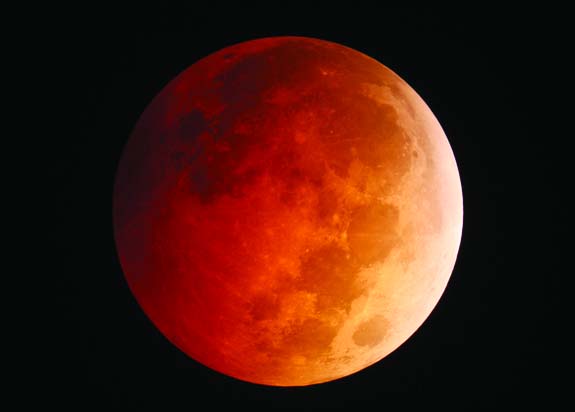
BBC Online :
A total lunar eclipse has been visible across much of the Americas and Asia, resulting in a dramatic “Blood Moon”.
The eclipse began at 08:00 GMT on the east US coast and was visible in Asia at about 10:00 GMT.
During the eclipse – which is the second to occur this year – our only natural satellite was fully covered by the Earth’s shadow.
The Moon appears orange or red, the result of sunlight scattering off our atmosphere, hence the name Blood Moon.
Weather permitting, skywatchers in North America, Australia, western South
America and parts of East Asia were able to see the spectacle.
The Hong Kong Space Museum set up free viewing locations on a harbour-side promenade while in Tokyo, yoga enthusiasts gathered to perform exercises under the Blood Moon.
In Australia, the Sydney Observatory also arranged a live video feed of the event.
Australian astronomer Geoff Sims watched the event from the Blue Mountains in New South Wales.
“The moon is very, very orange, it’s very, very obvious,” he said.
“On the other side of the sky, the Milky Way is starting to appear because the rest of the sky has darkened. It’s a very serene, kind of surreal experience actually.”
However, Europe, Africa and the eastern part of Brazil missed out on the show.
The last phase of the eclipse ended at 13:33 GMT.
The last total lunar eclipse occurred on 15 April, and the next is expected to take place on 4 April 2015.
There will be two full lunar eclipses again next year.
A total lunar eclipse has been visible across much of the Americas and Asia, resulting in a dramatic “Blood Moon”.
The eclipse began at 08:00 GMT on the east US coast and was visible in Asia at about 10:00 GMT.
During the eclipse – which is the second to occur this year – our only natural satellite was fully covered by the Earth’s shadow.
The Moon appears orange or red, the result of sunlight scattering off our atmosphere, hence the name Blood Moon.
Weather permitting, skywatchers in North America, Australia, western South
America and parts of East Asia were able to see the spectacle.
The Hong Kong Space Museum set up free viewing locations on a harbour-side promenade while in Tokyo, yoga enthusiasts gathered to perform exercises under the Blood Moon.
In Australia, the Sydney Observatory also arranged a live video feed of the event.
Australian astronomer Geoff Sims watched the event from the Blue Mountains in New South Wales.
“The moon is very, very orange, it’s very, very obvious,” he said.
“On the other side of the sky, the Milky Way is starting to appear because the rest of the sky has darkened. It’s a very serene, kind of surreal experience actually.”
However, Europe, Africa and the eastern part of Brazil missed out on the show.
The last phase of the eclipse ended at 13:33 GMT.
The last total lunar eclipse occurred on 15 April, and the next is expected to take place on 4 April 2015.
There will be two full lunar eclipses again next year.

